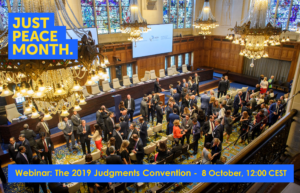HCCH Monthly Update: October 2021
Conventions & Instruments
On 5 October 2021, Indonesia deposited its instrument of accession to the HCCH 1961 Apostille Convention, in a ceremony held during the meeting of the Special Commission on the practical operation of the Apostille Convention. With the accession of Indonesia, the Apostille Convention now has 121 Contracting Parties. It will enter into force for Indonesia on 4 June 2022. With this accession, Indonesia becomes the 156th HCCH Connected Party. More information is available here.
Meetings & Events
On 4 October 2021, the HCCH hosted the 12th International Forum on the electronic Apostille programme (e-APP). Throughout the day, experts from around the globe shared their experiences with the development and implementation of the e-APP, its role in the context of e-Government initiatives, and the future of document authentication. More information is available here.
From 5 to 8 October 2021, the Fifth Meeting of the Special Commission on the practical operation of the Apostille Convention was held via videoconference. The meeting coincided with the 60th anniversary of the Apostille Convention. The Special Commission considered the scope and operation of the Convention, including the electronic Apostille Programme (e-APP). Delegates discussed matters relating to the COVID?19 pandemic, plans for the second edition of the Apostille Handbook, and the outcomes of the Experts Group on the e-APP and New Technologies. More information is available here.
On 7 October 2021, the HCCH hosted a virtual seminar on the HCCH 1965 Service Convention and the HCCH 1970 Evidence Convention for the Supreme Court of Ukraine. This will be the first of a series of seminars, organised through the generous support of the EU Project Pravo-Justice, aimed at facilitating the proper and effective implementation of the HCCH Conventions and instruments in Ukraine. More information is available here.
On 8 October 2021, the HCCH hosted a virtual seminar on the negotiation and adoption of the HCCH 2019 Judgments Convention. More information on the 2019 Judgments Convention is available here.
From 11 to 15 October 2021, the Working Group on Matters Related to Jurisdiction in Transnational Civil or Commercial Litigation met for the first time, via videoconference. The Group commenced work on the development of draft provisions on parallel proceedings, to further inform policy considerations and decisions in relation to the scope and type of any new instrument. More information is available here.
On 19 October 2021, the HCCH hosted the HCCH|Approach Global Event. Held online in celebration of the 25th anniversary of the HCCH 1996 Child Protection Convention, the event featured a series of lectures and a live panel discussion by global experts. The winners of the HCCH|Approach Essay Competition and the HCCH|Approach Media and Design Competition were announced during the event. More information is available here.
On 28 October 2021, the HCCH Regional Office for Latin America and the Caribbean hosted an online event for Central Authorities of the HCCH 1996 Child Protection Convention from the region, as part of the HCCH|Approach Initiative.
Other
Save the Date: HCCH a|Bridged Edition 2021 will be held online on Wednesday, 1 December 2021. This year’s edition will discuss contemporary issues relating to the application of the?HCCH 2005 Choice of Court Convention,?including the establishment of?international commercial courts around the globe and how it enables party autonomy. Registration will open on Monday, 1 November. More information is available here.
Vacancy: Applications are now open for the position of Library Assistant (8 to 16 hours per week). The deadline for the submission of applications is this Sunday, 31 October 2021 (12:00 a.m. CET). More information is available here.
These monthly updates are published by the Permanent Bureau of the Hague Conference on Private International Law (HCCH), providing an overview of the latest developments. More information and materials are available on the HCCH website.





